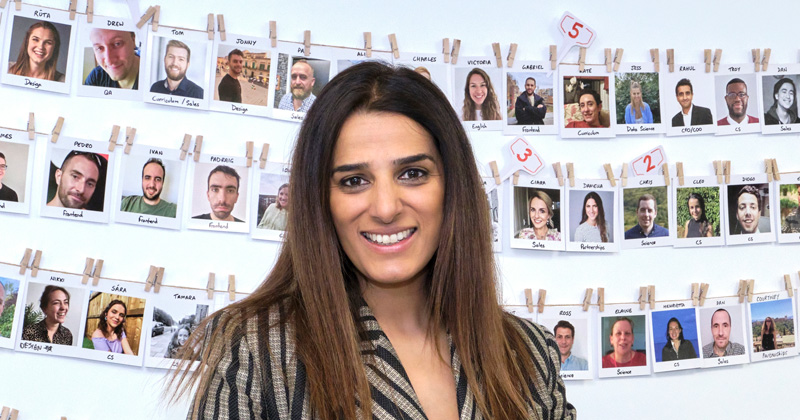Priya Lakhani is at pains to express how many of the achievements in her colourful career were driven by a strong moral conviction to make the world a better place.
This is because the founder of ed tech firm Century Tech is acutely aware of fears over the potential harms from technology being misused (she sits on the government’s AI Council). But also because of the “cruel” accusations thrown her way.
She recounts one investor meeting where an ed tech entrepreneur held up on stage a picture of Elizabeth Holmes – the American facing jail for fraud related to her failed blood-testing company – and told the audience: “This is the AI in Ed tech in the UK”.
This was “really awful and very hurtful”, Lakhani says, because “everyone knows” that her social enterprise firm, which provides a personalised learning platform for 1.2 million students in 55 countries, is “the big AI company not just in the UK, but Europe…and frankly the US. How dare they do that? That’s a defamation case, isn’t it?”
Lakhani would know the answer – before moving into business she was a libel barrister.
It means I’m at pains to walk the line between asking probing questions for objective journalism and not offending Lakhani.
In some ways it is easy: she is instantly likeable. Her door sign at Century’s London office, where Lakhani has been making “pancake cakes” for staff (like pancakes but deliciously spongey) reads ‘Dumbledore’s office’.
Like Harry Potter’s headmaster, she’s a wise and morally steadfast educational leader. Unlike him, her thoughts tumble out at 100 miles an hour, leaving me struggling to get a word in edgeways. Pinning her down on some of the tougher questions isn’t easy.
Autism claim questions
Century’s AI-powered, adaptive learning platform is used by 1,200 schools in England. Some 75 per cent of them are state-run and the rest independent, including Eton College.
It can be used in class for diagnostic assessments and lesson planning, or outside the classroom for homework or revision.
Its “personalised” approach adapts learning to the user and Lakhani says it saves teachers time by marking pupils’ progress. A dashboard tells them which students are struggling, why, and how to deal with them.
Prices start at £1,200 for primaries and £3,500 for secondaries. A randomised control trial of the AI is still lacking but Lakhani points to independent studies, such as one by Nesta which shows a 20-30 per cent improvement in adult learners’ digital skills.
Century’s AI, which incorporates “neuroscientific theories on memory function, engagement and motivation”, has been “trained on big data” for almost a decade now, “getting smarter” every time a learner uses it.
Lakhani bats off GDPR concerns about harvesting data: users are told the AI is analysing their data, which is later provided to teachers.

With autism, it was overwhelming, the patterns that we saw
Schools Week has also unsuccessfully tried to get answers to a well-reported claim from Lakhani that her AI can predict with 96 per cent accuracy whether a child is autistic.
Lakhani says behavioural tracking movements detected by the platform’s AI correlate with demographic data from school information management systems indicating whether a child has special needs.
“With autism, it was overwhelming, the patterns that we saw,” she says.
Studies show as many as one in 44 children may have autism. An Observer newspaper investigation last year found some children were waiting five years for an NHS autism appointment.
A tool to diagnose the condition could revolutionise the education and health sectors, and make big money. So why the secrecy?
She refuses again to publish “commercially sensitive” studies, adding: “We are an EdTech company, we put the ed before the tech…I have learned from the experts who know what they’re talking about that this [technology] is not an appropriate way to diagnose autism.
“It may be helpful in the future, with a human being as an aide. But if you’re going to advertise it can diagnose, it has to be done right. Century has to do things the right way.”
While she would “love to” work with an autism charity and academia to publish a “full study”, this is “a matter of timing and resources”.
Entrepreneurialism runs in the family
For now, Lakhani’s focus is “getting the technology in front of as many students as possible, improving outcomes, reducing teacher workload and to personalize as much as we can”.
She has a formidable work ethic that makes it hard to doubt she will succeed.
At grammar school, Lakhani was told by some teachers she would “never be a lawyer” because she was “brown and female”. She worked through lunch hours to prove them wrong.
At university, while other law students had two or three work placements, she had 20.
The day before her wedding, she made her own iced version of Nigella Lawson’s chocolate fudge cake for 600 guests.
On Christmas Day last year, Lakhani – accompanied by her 12-year-old daughter and ten-year-old son and two dogs – provided dinner for the homeless in Hamstead Heath.
How much of this boundless energy is perhaps down to her own ADHD?
Lakhani discovered she had the condition in her thirties but was “quite happy” not to have been diagnosed earlier. “Maybe the label would have affected me negatively, maybe not”, she says.
Growing up in Cheshire, Lakhani’s parents ran a manufacturing business. She spent holidays with family in Nairobi and was “spoiled rotten”, waited on by servants.
“It never felt quite right to me,” she says.
Her parents later moved to London, where her dad retrained as a “Grand Designs”-style architect designing “phenomenal” homes – including Lakhani’s.

Entrepreneurialism runs in the family: by 2012, Lakhani had quit law and built the country’s first fresh ethnic sauce company, Masala Masala, based on her mum’s traditional recipe. The social enterprise provided over three million meals and thousands of vaccines to the underprivileged in India and Africa, and funded nine schools there.
She was appointed an adviser to then business secretary Vince Cable’s entrepreneurs forum, alongside Dragon’s Den’s Julie Meyer and James Caan.
Lakhani recalls a meeting when Matt Hancock, then a junior business minister, said: “20 per cent of our nation can’t read, write or do maths well enough to get a good job at the end of formal education – and this is a problem that we need to solve”.
Lakhani calls it a “real wake up moment… I’d just spent four years funding schools in Commonwealth countries that all replicate the British model, which doesn’t work for 20 per cent of our kids. What’s going on?”
The turn of the Century
So she turned her sights to education and learned from leaders across all types of schools that, while different, they used the same “one size fits all delivery”.
“Teachers were complaining… They were showing me all this marking and assessing they were doing which looked just like when I was at school. They were frazzled with all this work.”
Lakhani took several ‘nanodegree’ online AI courses and became “completely hooked”.
She already knew neuroscience: after being beaten with a brick during a robbery 13 years ago, she read “every medical journal related to PTSD written since the Vietnam War”.
When building the company, she said she was “laughed out the door by every venture capitalist” because she is “not a former Google engineer”.
She was told “you don’t look like an AI entrepreneur”, and one investor asked her: “Sweetheart, can you explain what AI is to me?”
But Lakhani convinced enough backers to believe in her. Century has raised £22 million in investment, and Lakhani claims it no longer requires further funding.
Despite being 10 years old, it is still classed as a “small” company and does not have to file audited accounts (it meets two of the three thresholds: a turnover of £10.2 million or less, £5.1 million or less on its balance sheet, or fewer than 50 employees).
Annual accounts show Century has posted a £16.5 million loss since it was founded – £3.3 million of that was in 2021-22.
Lakhani says this shows the invested money being spent. But she gives the impression throughout our conversation that her overriding objective is to improve education, rather than make as much money as possible.
She said the company is “on the path to break even”. A global expansion includes partnering with the Canadian online learning company D2L to host its K-12 curriculum which last month launched in the US. Six other partnerships are planned over the next six months.
Vitriol is ‘extraordinary’
Lakhani is now writing a book on disinformation and fake news, her third book, following one on why the current education system is failing and a sci-fi children’s story. It follows someone creating a fake Twitter account of her in 2019 when ministers across different countries were seeking to adopt Century’s tech. The account tweeted ministers “calling them really horrible words” that Lakhani “would never repeat”.
The ruse was so authentic, she was messaged by a Department for Education official asking her to stop tweeting.
“I’m just trying to mind my own business, just trying to solve a couple of problems in education and the amount of vitriol I have received…is extraordinary.”
But she points to the “extraordinarily kind” people in the education sector who “keep [her] going. When I meet them, it just reminds me why I’m doing what I’m doing. People think entrepreneurs are just so resilient, but actually it does take the community.”














Your thoughts